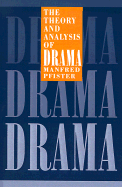Book contents
- Frontmatter
- Contents
- Preface
- Translator's note
- A note on the English edition
- 1 Drama and the dramatic
- 2 Drama and the theatre
- 3 Sending and receiving information
- 4 Verbal communication
- 5 Dramatis personae and dramatic figure
- 6 Story and plot
- 7 Structures of time and space
- Concluding note
- Notes
- Bibliography
- Index of authors
1 - Drama and the dramatic
Published online by Cambridge University Press: 01 June 2011
- Frontmatter
- Contents
- Preface
- Translator's note
- A note on the English edition
- 1 Drama and the dramatic
- 2 Drama and the theatre
- 3 Sending and receiving information
- 4 Verbal communication
- 5 Dramatis personae and dramatic figure
- 6 Story and plot
- 7 Structures of time and space
- Concluding note
- Notes
- Bibliography
- Index of authors
Summary
A critical summary of existing theories
The continuing influence of normative and deductive theories of drama
Our efforts to put forward a descriptive and communicative poetics for a historically and typologically extremely diverse corpus of dramatic texts have not been greatly assisted by previous theoretical discussions of the dramatic genre, which all tend to elevate a historically specific form to an absolute norm, thereby narrowing the concept of ‘drama’ in a most decisive way. This was already true of Aristotle's theory of drama. Although he derived his theoretical categories epagogically from the text corpus of Greek tragedies and although it was not his intention to establish a norm, his description of drama as the ‘imitation of an action’ in speech, involving closed structures of time and space and a particular set of characters, not to mention his concepts of catharsis and hamartia, have, since the Renaissance at least, been considered as the norm for dramatic texts. The same is true of the dramatic theories of the nineteenth and early twentieth centuries, which, based on the classical tragedy, European Renaissance drama and the plays of German and French classicism, identified conflict as the essence of the dramatic (G. W. F. Hegel, F. Brunetière, W. Archer et alii). Others used Hegel's subject–object dialectic as a point of departure to define drama as a synthesis of epic objectivity and lyric subjectivity (G. W. F. Hegel, F. W. Schelling, F. Th. Vischer et alii) and allocated to it the temporal dimension of future (Jean Paul, F. Th. Vischer, G. Freytag et alii) or the distinctive quality of suspense (E. Staiger).
- Type
- Chapter
- Information
- The Theory and Analysis of Drama , pp. 1 - 12Publisher: Cambridge University PressPrint publication year: 1988

